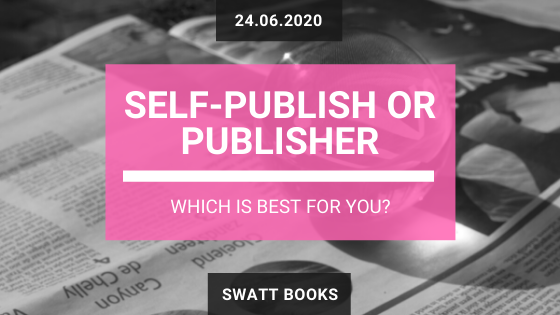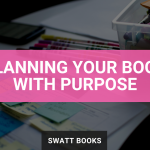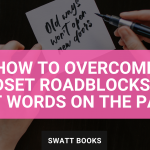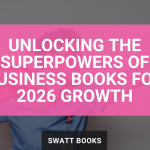A debate has raged in the literary community for decades as to whether self-publish or publisher is the best route for authors to take to get their books into the hands of their readers. Both sides of this equation are so evenly matched, it’s very difficult to choose a clear winner. There are pros and cons on both sides of the fence, so I feel authors should look at all the facts and make an informed decision as to which publishing route is best for them and their book.
We’re going to look at seven key aspects of the publishing process and compare how self-publish or publisher match up in each category.
Creative Control
Let’s first look at who has creative control during the process of creating your book for public consumption. This involves who has the final say in decisions regarding editing, design, and marketing copy.
| Self-Publish | Publisher |
|---|---|
| • Because you hire the editor, cover artist, typesetter, you are the client – you have the final say in all creative decisions. • You can make decisions based on what you feel is in the best interest of your readers and your content (taking into account the professional advice from author services you hire). | • The publisher uses their own in-house editors, cover artists and typesetters so the project manager in charge of your title makes the final decisions regarding creative. • You may be consulted depending on the individual publisher, but they are not entitled to adhere to your wishes. • Decisions are based on what will sell the most copies, which may not always be what is best for your readers or you as an author. |
Deciding Factor: Think about what the purpose of publishing your book is. If it is to simply tell a story, to entertain, or get information into as many hands as possible, then a publisher may be a good option for you. If your content is highly specialised and needs to be portrayed in a particular way to be of the most benefit for your reader, then self-publish is a better option where you will have more control over how that content is presented.
Royalties
The distribution of royalties (or the profit from selling a copy of your book) is wildly different between self-publish and publisher options. The profit of each book is calculated as the cover price, minus any wholesale discount required by the retailer who sells the book, minus production and distribution costs.
| Self-Publish | Publisher |
|---|---|
| • You keep 100% of the profit from each copy sold. • If you price your book carefully and are economical in setting the print specifications and wholesale discounts for your book, this can range from 40%-60% of your cover price. | • The average publishing contract states a royalty distribution to the author of between 5%-10% of the cover price which is treated as a cost to the publisher. • Many publishers will also incur the additional cost of sales agents whose job it is to sell books wholesale into bookstores that individual authors rarely have the option to do. • The publisher keeps all remaining profit for themselves. • Some publishers include clauses in their contracts that authors only receive royalty distribution once the publisher has recovered all costs of publishing the book. |
Deciding Factor: If you are not anticipating selling thousands of copies and you are looking to earn a residual income from publishing, then self-publishing is the more profitable route for you in the long run. However, if you have a large following and are likely to sell in high volumes continually, then going with a publisher may be a better option but be sure to negotiate as much as you can into your initial contract.
Time to market
Next, let’s look at the varying amount of time it takes to get a book from raw manuscript to market via self-publish or publisher.
| Self-Publish | Publisher |
|---|---|
| • If you employ all the author services that a publisher would (such as editors, cover artists and typesetters) it can take an average of 3-4 months to go from raw manuscript to having a title on sale. | • Because a publisher is usually publishing several books at any given time, it can take upwards of 12 months from the point a contract is signed to your book being on sale. • This does not include the time it takes pitching your book to agents and publishers to get a publisher to offer you a contract in the first place, and then time to properly negotiate that contract. |
Deciding Factor: If you have any sort of deadline of when you want to get your book published, self-publishing is really your only option. This is particularly true if you are publishing a book to support a business, as it is far easier to build a three to four month lead time into your marketing strategy then it is to anticipate what might possibly happen a year from now.
Marketing
This is the one that catches everyone out – who is responsible for marketing a book and its author once it’s published?
| Self-Pubish | Publisher |
|---|---|
| • Even if you are clever with generating SEO-packed metadata, no one will know your book exists without you telling them – all marketing is down to you as the author. • Good news is that there is an abundance of PR and marketing agencies around that specialise in promoting books and authors. | • As a general rule of thumb, publishers will not heavily market your book beyond an initial launch. • Unless the author is well known, or initial sales are very good, publishers will stop any marketing activities once they have recuperated their initial investment. • Any marketing activities the publisher does will usually require involvement or participation by the author (such as book signings and interviews). |
Deciding Factor: If you are looking for a free ride when it comes to marketing, I’m afraid you won’t find one under either option. The difference between self-publish and publisher here is all down to your comfort level with marketing strategies and/or your available budget to invest in marketing support.
Distribution
Historically, distribution was were the large divide between self-publish and publisher options lay –where you could make your book available for sale and how you got it there.
| Self-Publish | Publisher |
|---|---|
| • Using a PoD (print-on-demand) publishing model such as IngramSpark or Amazon KDP can get your book listing in over 7k online bookstores, general retailers, libraries and universities worldwide with no involvement from the author beyond listing and artwork supply. • Stocking a book in a physical bookstore requires the author to ‘pitch’ their book to a buying team at each store or chain, but once an agreement has been reached, fulfilment is done PoD. | •The publisher manages all distribution. • Depending on the size of the publisher, they will have distribution agreements already in place with the major booksellers for both online and in-store. • The larger publishers will also have a team of sales reps who visit independent bookstores to sell your book into those retailers. |
Deciding Factor: If your book can comply with a standard set of print specifications (such as a standard-sized paperback on uniform paper stock with no special print finishes) then you can achieve the same level of distribution self-publishing as you can going with a publisher and still retain all the other benefits. However, if your book does not comply with PoD specifications in any way, then a publisher is your best bet of getting the widest distribution possible. A self-published author can distribute a non-standard book themselves, however, it requires a lot of logistics and a great deal of involvement from the author.
Cost
The cost of publishing a book and who pays that cost is the biggest difference when it comes to the question of self-publish or publisher.
| Self-Publish | Publisher |
|---|---|
| • The author pays for all costs involved in publishing a book. • Many authors are now turning to crowdfund options to help cover costs in advance. | • The publisher pays for all costs involved in publishing a book. • Depending on your publishing contract, the publisher may also pay the author an advance or signing bonus. |
Deciding Factor: Self-publishing a book to similar quality and professionalism as a publisher is not cheap (£2,000-£4,000), so if costs are a concern then a publisher is your best option. However, with dedication and perseverance self-publishing can be very lucrative and can potentially pay for itself many times over.
Ownership
The final point I want to discuss is ownership; who owns the final published book once all is said and done.
| Self-Publish | Publisher |
|---|---|
| • The author retains full ownership of all aspects of the published book. • If the author also owns the ISBN numbers used in the publishing of that book, they also retain control over that book in terms of whether it remains on sale. | • The author will retain creative copyright over the content of the book, but the publisher will own the rights to the published book. • Some contracts even sign over copyright for a period of time, with the potential for a buy-back of rights. |
Deciding Factor: Writing a book can be a very personal thing. If you want to retain full control and ownership of your work, then self-publishing is your only option.
Conclusion
Hopefully, that has helped to breakdown the various differences between the self-publish or publisher options when it comes to how you get your book into the hands of your readers.
As you can see, there is no clear-cut right or wrong answer when it comes to which option is best. It’s more a question of which option is best for you, your book and what you ultimately want to achieve out of publishing it.
If you have any questions about the differences between self-publishing and using a publisher or want to share your own experience of deciding between the two, please leave a comment – I’d love to hear from you.






You have explained this so beautifully about the difference between self publish and publisher this article surely gave me a more clear idea about what to opt for will surely share this with my friends and family as well for their reference as well.